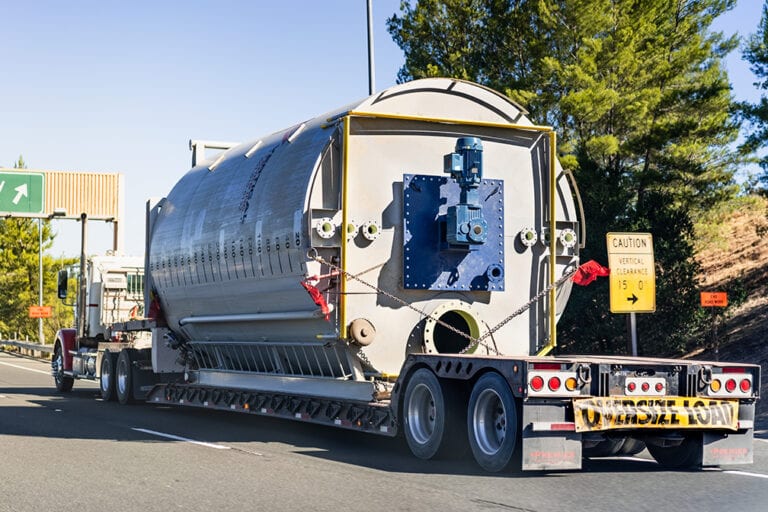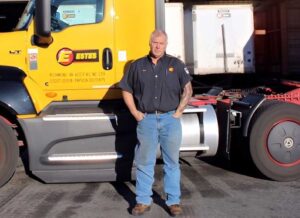INDIANPOLIS — A bill making its way through the two-house Indiana legislature would level the playing field for logistics companies wishing to ship overweight loads within that state.
House Bill 1190 has cleared the Indiana House of Representatives and moved on to the state Senate where it awaits committee debate, said Rep. Jim Pressel of Rolling Prairie (R-20), who sponsored the bill.
“For the last two (legislative) sessions I’ve carried legislation along with Sen. Jon Ford of Indianapolis (R-38) to at least get this into summer study committees,” said Pressel, a career homebuilder who also spent a decade as an over-the-road truck driver.
“This is my first year as Roads and Transportation chair and a lot of the stakeholders came to me with ‘What are your thoughts on this? We know you’ve been active in trying to at least start the conversation,’” he said. “As the first-year chairman, I thought this will be a great bill to get the conversation going.”
Pressel said the new bill expands an option, already on the books in Indiana, by which trucking companies can haul overweight loads via a special permit. Passed by the state legislature in 2014, the permit is restricted to only three industries — steel, agricultural products and paper. Among just those three industries, the number of permits issued has grown appreciably, up 66% between 2017 and 2020.
The new bill opens the permit — which allows overweight loads up to 120,000 pounds — to all industries. Pressel said because the original law predates his time in the legislature, he could not comment on why the original program only allows three industries. But, he said, he couldn’t see why the state should, in his words, “pick winners and losers,” via eligibility for this permit.
“I don’t think that’s fair,” he said. “I don’t think we should do that.”
The bill would also update the cost of the permit to help pay for anticipated extra wear and tear on state roadways. The current permit, issued through the Indiana Department of Transportation (INDOT), currently costs $20 for an annual permit and $20 plus a per-mile fee for a single trip. Under the new statute, the annual permit would see a substantial bump to $350, and the cost of a per-trip permit would jump 30%, but still remain well shy of the cost of breaking an overweight load into multiple trucks.
Pressel said the bill has the enthusiastic support of the Motor Truck Association but also has its detractors. Some legislators worry about the effect of increased truck weight on roadways, while other groups decry the safety issue of heavier trucks being involved in traffic accidents. The safety factor has drawn opposition to House Bill 1190 from the Indiana Association of Chiefs of Police and the Indiana Sheriff’s Association.
As chair of the House Roads and Transportation Committee, Pressel said he appreciates both concerns, which is why the bill provides a cap of 118,950 trip permits issued annually. In addition, permit holders will continue to be restricted to specific routes, avoiding certain bridges and local roads.
He also points to language in the bill that directs INDOT to supply annual assessments of the impact of increased overweight loads on highway surfaces to guide future decision-making.
Specific to safety, Pressel noted that two associations of front-line emergency responders — those presenting Indiana’s state police and professional firefighters — are neutral on the proposal. What’s more, he said, current statistics bear out a stellar safety record specific to overweight loads.
“We’ve got some really good data internally since (we started) doing this in 2014,” he said. “In 2019, we had around 113,000 of these single-trip permits, equivalent to about 14 million miles. And in that 14 million miles, taking a look at overweight, oversized, over-length trucks, there were somewhere around 145 property damage reports, zero fatalities and three injuries.”
In contrast, Pressel argues, eliminating overweight loads entirely would put 50,000 more truck trips on Indiana roadways, which ups the statistical probability of accidents.
“I’m optimistically hopeful. I think (the bill) is going to move,” Pressel said. “I emphasize all the time that we currently do these permits today. I think the majority in the general assembly would agree with me when I say we should not pick winners and losers.
“This is not something new to Indiana, but to expand it we have to make educated decisions on this,” he continued. “We should move cautiously and make sure that this is done right. I think this bill does that.”
Dwain Hebda is a freelance journalist, author, editor and storyteller in Little Rock, Arkansas. In addition to The Trucker, his work appears in more than 35 publications across multiple states each year. Hebda’s writing has been awarded by the Society of Professional Journalists and a Finalist in Best Of Arkansas rankings by AY Magazine. He is president of Ya!Mule Wordsmiths, which provides editorial services to publications and companies.












Solution is to allow no 120,000 trucks, not “level the playing field”.
Trucks are subsidized today, per INDOT and Purdue Joint Transportation study.
The laws of physics apply in Indiana, heavier objects cause more damage.
Most law enforcement and first responders oppose, conveniently name only those that are neutral.
The laws of economics also apply in Indiana, bigger trucks means more trucks, not fewer.
The public opposes nationally and by a 2-1 margin in Indiana.
Bad policy from day one.
Do the trucking companies see a benefit?
Are we doing this to make trucks more profitable within Indiana or to make truckers from Michigan and Canada more profitable? Who really is going benefit from this? It seems that the further you come from or go to the costs drop. Increasing weights within the state reduces trucks, which reduces jobs which reduces revenues from more vehicles on road spending money on vehicles, parts, fuels and licenses. If the cost of road repairs and first responder costs increase we as a state lose on both ends. Seems we had a Canadian company lobbying our state law!